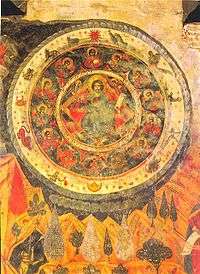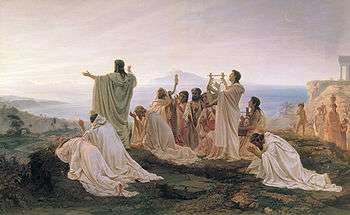Esoteric Christianity
| Part of a series on |
| Spirituality |
|---|
|
Spiritual experience |
|
Spiritual development |
| Influences |
|
Western General
Antiquity Medieval Early modern Modern |
|
Asian Pre-historic
Iran India East-Asia |
| Research |
|


Esoteric Christianity (also known as Hermetic Christianity or Mystic Christianity) is an ensemble of spiritual currents which regard Christianity as a mystery religion,[1][2] and profess the existence and possession of certain esoteric doctrines or practices[3][4] of which the public is unaware (or even to which they may be denied access) but which are understood by a small group of people.[5]
These spiritual currents share some common denominators, such as heterodox or heretical Christian theology; the canonical gospels, various apocalyptic literature, and some New Testament apocrypha as sacred texts; and disciplina arcani, a supposed oral tradition from the Twelve Apostles containing esoteric teachings of Jesus the Christ.[6]
Mystery religion
The word "mysticism" is derived from the Greek μυω, meaning "to conceal",[7] and its derivative μυστικός, mystikos, meaning 'an initiate'. In the Hellenistic world, 'mystical' referred to "secret" religious rituals.[7] The use of the word lacked any direct references to the transcendental.[8] A "mystikos" was an initiate of a mystery religion.
Theologians give the name mystery to revealed truths that surpass the powers of natural reason,[9] so, in a narrow sense, the Mystery is a truth that transcends the created intellect. The impossibility of obtaining a rational comprehension of the Mystery leads to an inner or hidden way of comprehension of the Christian Mystery that is indicated by the term esoteric in Esoteric Christianity.[2]
Even though revealed and believed, the Mystery remains nevertheless obscure and veiled during the mortal life, if the deciphering of the mysteries, made possible by esotericism, does not intervene.[10]
This esoteric knowledge would allow a deep comprehension of the Christian mysteries that otherwise would remain obscure.
Ancient roots

The first clear mention of people who saw Christianity as a mystery religion with esoteric unveiled transcendental teachings were the Gnostic Christian groups, that originated in the 1st Century in Christian Jews milieus. Some non-Christian Jewish related groups also talked about esoteric teachings, secrets and initiation, like the Mandeans, who are still existing today and claims to be the followers of John the Baptist, and the Essenes and Therapeutae. Some modern scholars believe that in the early stages of non-Gnostic Christianity, a nucleus of oral teachings were inherited from Palestinian and Hellenistic Judaism. In the 4th century, it was believed to form the basis of a secret oral tradition which came to be called disciplina arcani. The mainstream theologians, however, believe that it contained only liturgical details and certain other traditions which remain a part of some branches of mainstream Christianity.[6][11][12] Important influences on Esoteric Christianity are the Christian theologians Clement of Alexandria and Origen, the leading figures of the Catechetical School of Alexandria.[13]
Reincarnation was accepted by most of Gnostic Christian sects such as Valentinianism and Basilidians, but denied by the proto-orthodox one. While hypothetically considering a complex multiple-world transmigration scheme in De Principiis, Origen denies reincarnation in unmistakable terms in his work Against Celsus and elsewhere.[14][15]
Despite this apparent contradiction, most modern Esoteric Christian movements refer to Origen's writings (along with other Church Fathers and biblical passages[16]) to validate these ideas as part of the Esoteric Christian tradition outside of the Gnostic schools, who were later considered heretical in the 3rd century.[17]
See also
- Anthroposophy
- Astrological age
- Book of the 24 Philosophers
- Charismatic Christianity
- Christianity and Neopaganism
- Christianity and Paganism
- Christianity and Theosophy
- Christian Kabbalah
- Christian meditation
- Christian mysticism
- Christian mythology
- Christian views on astrology
- Christian views on magic
- Esoteric astrology
- Gnosticism
- Martinism
- Neoplatonism
- Occult
- Origins of Christianity
- Rosicrucianism
- Spirituality
- "The Esoteric Character of the Gospels"
- Theosophy (Boehmian)
References
- ↑ Western Esotericism and the Science of Religion: Selected Papers Presented at the 17th Congress
- 1 2 Besant, Annie (2001). Esoteric Christianity or the Lesser Mysteries. City: Adamant Media Corporation. ISBN 978-1-4021-0029-1.
- ↑ From the Greek ἐσωτερικός (esôterikos, "inner"). The term esotericism itself was coined in the 17th century. (Oxford English Dictionary Compact Edition, Volume 1, Oxford University Press, 1971, p. 894.)
- ↑ Wouter J. Hanegraaff, Antoine Faivre, Roelof van den Broek, Jean-Pierre Brach, Dictionary of Gnosis and Western Esotericism, Brill 2005.
- ↑ Merriam-Webster Online Dictionary: esoteric
- 1 2 G.G. Stroumsa, Hidden Wisdom: Esoteric Traditions and the Roots of Christian Mysticism, 2005.
- 1 2 Gellman, Jerome, "Mysticism", The Stanford Encyclopedia of Philosophy (Summer 2011 Edition), Edward N. Zalta (ed.)
- ↑ Parsons, William Barclay (2011), Teaching Mysticism, Oxford University Press, p. 3
- ↑ The Catholic Encyclopedia, Volume X. Published 1911.
- ↑ Tommaso Palamidessi, Introduction to Major and Minor Mysteries, ed. Archeosofica, 1971
- ↑ Frommann, De Disciplina Arcani in vetere Ecclesia christiana obticuisse fertur, Jena 1833.
- ↑ Edwin Hatch, The Influence of Greek Ideas and Usages upon the Christian Church, London: Williams and Norgate, 1907, Lecture X.
- ↑ Jean Daniélou, Origen, translated by Walter Mitchell, 1955.
- ↑ Catholic Answers, Quotes by Church Fathers Against Reincarnation Archived June 28, 2011, at the Wayback Machine., 2004.
- ↑ John S. Uebersax, Early Christianity and Reincarnation: Modern Misrepresentation of Quotes by Origen, 2006.
- ↑ See Reincarnation and Christianity
- ↑ Archeosofica, Articles on Esoteric Christianity Archived 2007-11-02 at the Wayback Machine. (classical authors)
Further reading
- Anonymous (1985). Meditations on the Tarot: A Journey Into Christian Hermeticism. New York, NY: Tarcher/Penguin. ISBN 978-1-5854-2161-9
- Besant, Annie (2001). Esoteric Christianity or the Lesser Mysteries. City: Adamant Media Corporation. ISBN 978-1-4021-0029-1.
- Brown, Coleston (2007). Magical Christianity: The Power of Symbols for Spiritual Renewal.Wheaton, IL: Quest Books. ISBN 978-0-8356-0855-8
- Duncan, Anthony (1972, 1996). The Lord of the Dance: An Essay in Mysticism. Sun Chalice Books. ISBN 978-0-9650-8395-9
- Knight, Gareth (1975, 2010). Experience of the Inner Worlds. Cheltenham, Gloucestershire: Skylight Press. ISBN 978-1-9080-1103-9
- Knight, Gareth (2011). A History of White Magic. Cheltenham, Gloucestershire: Skylight Press. ISBN 978-1-9080-1104-6
- Powell, Robert. (2007). The Sophia Teachings: The Emergence of the Divine Feminine in Our Time. Aurora, CO: Lindisfarne Books. ISBN 978-1-5842-0048-2
- Rittelmeyer, Friedrich (Author), Mitchell, M.L. (Translator) (2004). Meditation: Letters on the Guidance of the Inner Life 1932. Whitefish, MT: Kessinger Publishing, LLC. ISBN 978-1-4179-7983-7
- Smoley, Richard (2002). Inner Christianity: A Guide to the Esoteric Tradition.Boston, MA: Shambhala Publications. ISBN 978-1-5706-2810-8
- Steiner, Rudolf (1997). Christianity As Mystical Fact And The Mysteries Of Antiquity. Great Barrington, MA: Anthroposophic Press. ISBN 978-0-8801-0436-4
External links
| Wikimedia Commons has media related to Esoteric Christianity. |